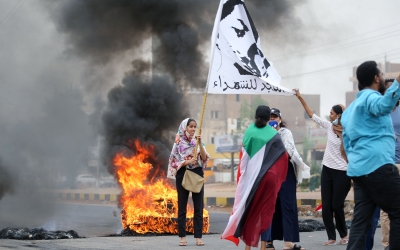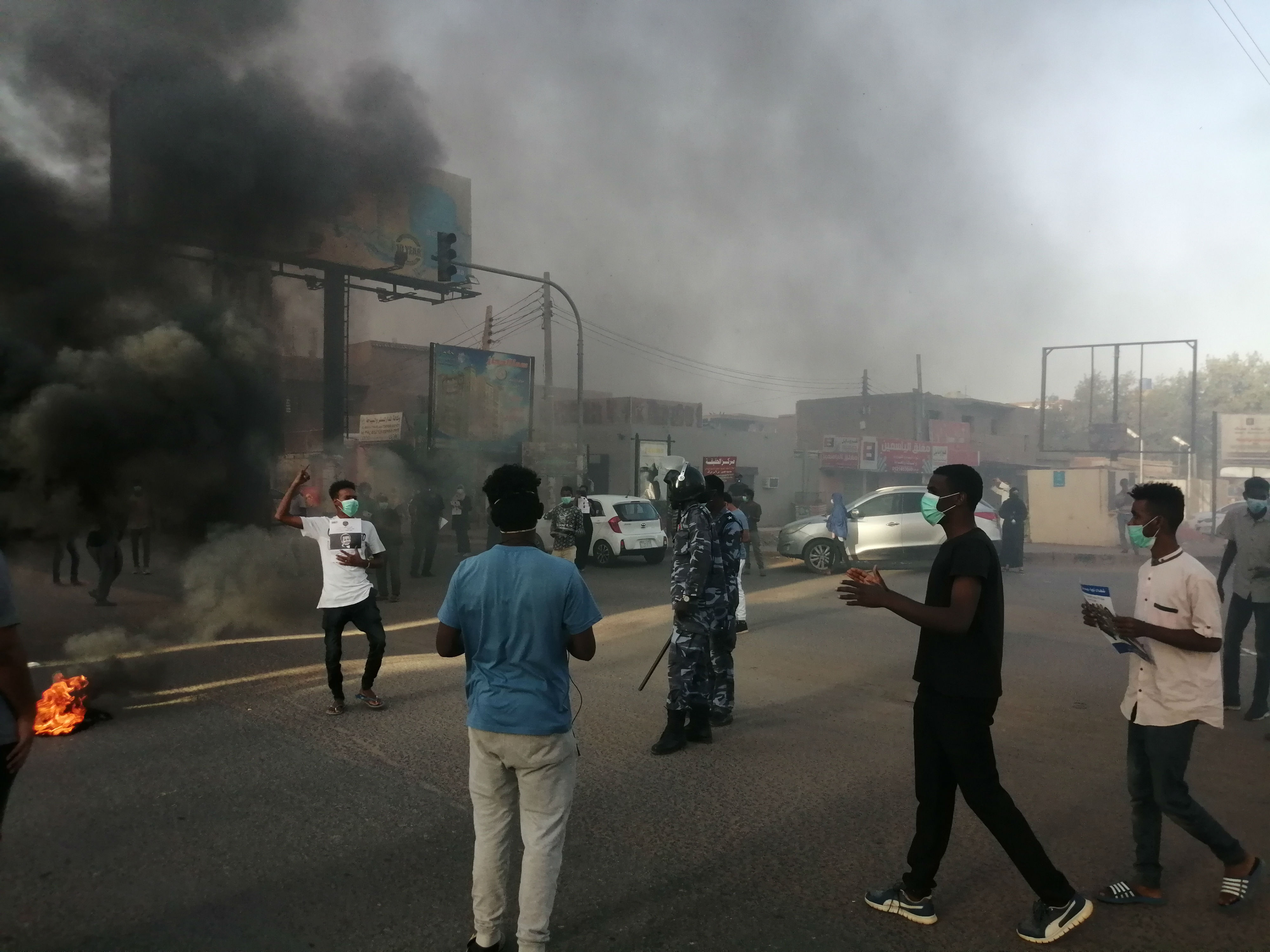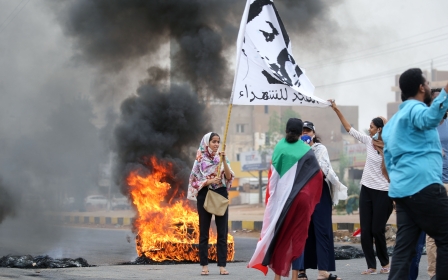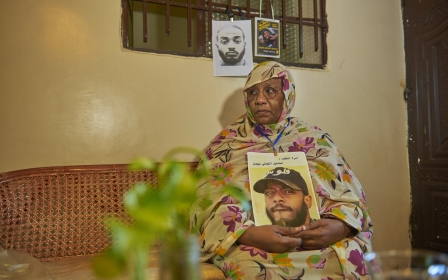'Justice is still far away': Sudan protesters mark anniversary of 2019 massacre
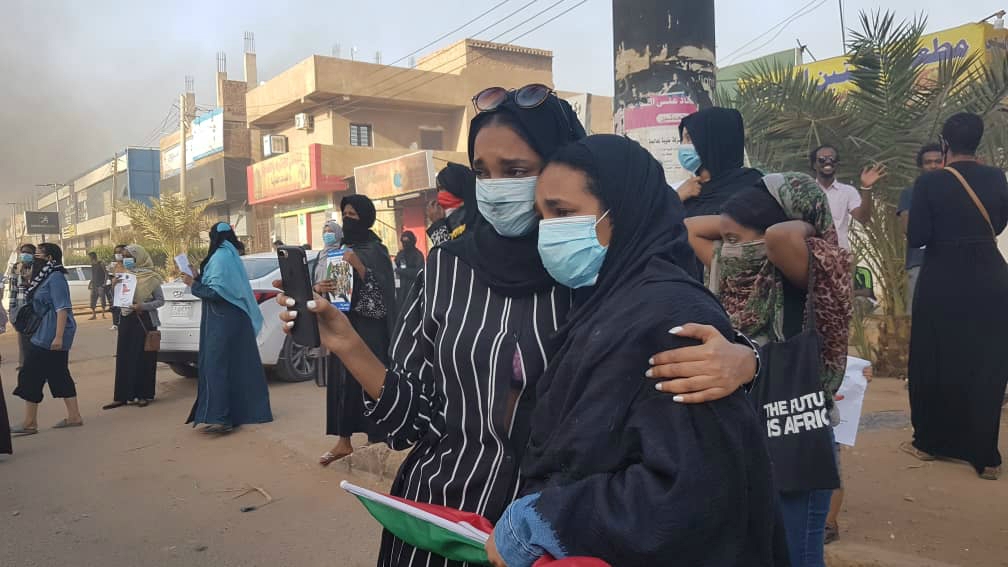
With tears and sad songs, Sudanese pro-democracy protesters who helped bring down former president Omar al-Bashir returned to the streets on Wednesday to mark the first anniversary of a massacre in front of the army headquarters in Khartoum that left more than 100 protesters dead.
At least 23 people also went missing on 3 June 2019 and in the days after the dispersal of the sit-in in the Sudanese capital.
Painting the surrounding walls, streets and trees, thousands of protesters chanted slogans demanding justice and freedom and full civilian rule for Sudan, and calling for the perpetrators of the mass killing to be held accountable soon.
Demonstrators chanted anti-military slogans and said they held the Rapid Support Forces (RSF), a militia headed by the current deputy chairman of the Sovereign Council, Mohamed Hamdan Dagalo, responsible for the deaths.
They also criticised the investigation committee formed by the Sudanese Prime Minister Abdallah Hamdok last September to probe the circumstances of the dispersal of the sit-in.
Other marches have also been organised by the Sudanese Professionals Association (SPA), a member of the ruling political coalition of the Forces for Freedom and Change (FFC), which led the protests against Bashir, and other resistance committees across the 17 states outside Khartoum.
Meanwhile, families of the victims hinted they might seek justice at the African Court on Human and Peoples' Rights if they are not satisfied with the results of the investigation.
'Blood with blood'
In Burri, a neighbourhood of northern Khartoum, which was one of the flashpoints during the protests against Bashir, protesters burned tyres and chanted: “Blood with blood, no compensation” and “We were killed by perpetrators in RSF cars with RSF number plates.”
Sara Kamal, 19, told Middle East Eye that the commemoration of the massacre was very important as it highlighted that there is no freedom or peace without justice.
“We want to see all those perpetrators behind bars and even to be executed in front of our eyes. We won't accept less than this," she cried.
"I lost my friends and a lot of families lost their loves, so all these wounds are still open and will never be cured without justice.
Alwaleed Ahmed, 35, who was protesting at Al Siteen street in Khartoum, told MEE that he was “really frustrated that the justice for our martyrs is still so far away.
"Because, as we see [it], the generals of the Transitional Military Council (TMC), who were responsible for the entire country at the moment of the massacre, are enjoying immunity now and have seized the top positions of the state.
"So that means there are political compromises underway to cover up this issue, but we won’t allow that.”
Abdul-Aziz Mamoun, 59, told MEE that the investigation committee, headed by Nabil Adeeb, must be responsible for disclosing honest and transparent results.
Furthermore, he warned that “any attempts to manoeuvre or compromise will lead to horrible political consequences, and the country will never be stable unless this issue is addressed fairly”.
Adeeb has defended the committee’s work, stressing that it is doing its job properly, a claim rejected by the protesters.
'Devil cycle of political violence'
Protesters who faced the bullets outside the army headquarters on 3 June were gunned down, while others were rounded up.
Tents were burned and an untold number of bodies were thrown into the Nile.
Many of the soldiers filmed themselves as they marched through the sit-in area, beating protesters with canes and demanding they chant in favour of the military.
Within a few hours, there was nothing left of the sit-in that had lasted almost two months.
Hamdok has pledged to achieve justice in Sudan and bring the killers of the protesters to justice.
Addressing the nation on Wednesday, the prime minister stressed that Sudan needed to break the “devil cycle of political violence”, including against civilians, as well as stopping civil war and bringing a comprehensive peace to warzones across the entire country.
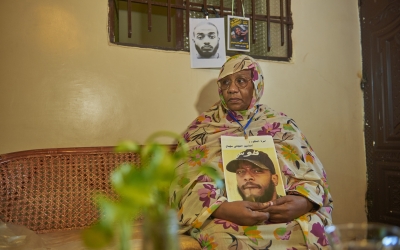
“The transitional government is waiting for the results of the investigation committee in order to impose justice and the rule of law. We are committed to disclosing the entire details of the crimes committed on 3 June and that is the only way forward towards reconciliation and peace in our country,” said Hamdok.
“Sudan is in need of a new vision for development and democracy based on a comprehensive project of accountability, transitional justice and peace.”
Echoing the concerns of protesters, the United Nations has called for a credible investigation into the brutal attack against protesters on 3 June last year.
In a press release on Wednesday, Gwi-Yeop Son, the UN humanitarian coordinator in Sudan, said that the body was fully committed to assisting the transition of Sudan towards democracy.
“On behalf of the United Nations Country Team in Sudan, I reiterate the United Nations Secretary General’s call to the authorities to credibly and independently investigate and bring to justice those responsible for the reported violations of human rights,” the statement read in part.
“The establishment of the National Independent Investigation Committee by the Transitional Government to investigate allegations of human rights violations committed on 3 June and other related incidents, last September 2019, is a crucial step toward justice and accountability.”
Immunity law
Many Sudanese have criticised the immunity law in Sudan’s new constitutional charter that protects members of the state from criminal proceedings, including Mohamed Hamdan Dagalo, also known as “Hemeti”, the head of the RSF, which is widely accused of being behind the massacre.
The law, however, also states that the immunity may be lifted after an order from the legislative council.
The SPA and FFC have joined protesters in calling for an acceleration of the investigation process into the massacre in order to bring about justice and bolster the rule of law in the country.
“We joined our voice to all Sudanese, especially the families of the martyrs, to bring the perpetrators to justice and to lift any kind of immunity and pave the way for the rule of law in our country,” it said in a statement.
“We call on the Council of Ministers and the Sovereign Council to announce 3 June as an official holiday in the entire country because we will never forget our people and the martyrs.”
Middle East Eye delivers independent and unrivalled coverage and analysis of the Middle East, North Africa and beyond. To learn more about republishing this content and the associated fees, please fill out this form. More about MEE can be found here.


